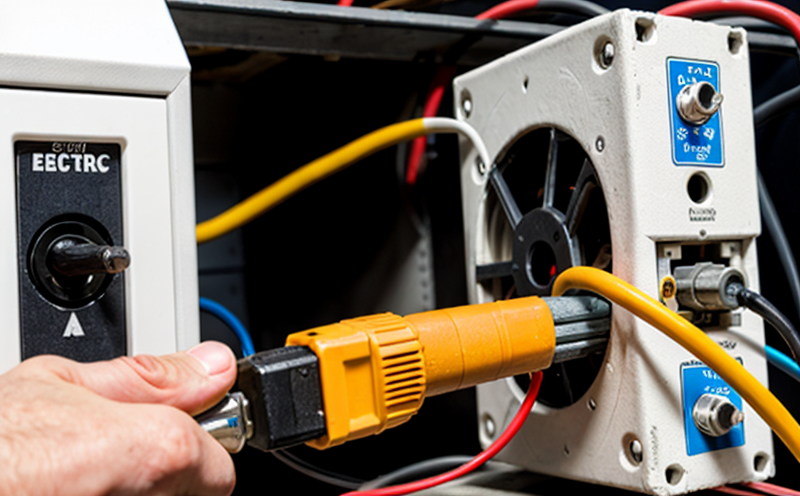ISO 12100-4 Electrical Hazard Prevention
The ISO 12100 series of standards provides a framework for the design, construction, and operation of machinery to ensure that electrical hazards are minimized. The standard focuses on identifying and mitigating potential risks associated with electricity in machinery. Specifically, ISO 12100-4 addresses the prevention of electrical hazard incidents by ensuring that electrical systems within machinery are designed, constructed, and maintained to prevent electric shock, fire, and other electrical hazards.
The standard covers a wide range of aspects including but not limited to: isolation of live parts, protection against overvoltage and undervoltage conditions, grounding and bonding requirements, and the use of barriers and guards. Compliance with ISO 12100-4 is essential for manufacturers of HVAC equipment as it ensures that electrical systems are safe for both the operators and maintenance personnel.
For HVAC equipment testing laboratories, this standard represents a critical component in ensuring that products meet rigorous safety requirements before being released to market. By adhering to these standards during the design phase, potential hazards can be identified early on, allowing manufacturers to correct issues before production begins. This not only enhances product reliability but also reduces liability risks associated with electrical accidents.
The testing process typically involves evaluating various aspects of an HVAC system's electrical components under controlled conditions that simulate real-world usage scenarios. Key parameters include voltage levels, current flow, insulation resistance checks, and temperature rise measurements. These tests are conducted using specialized equipment designed to accurately measure the performance characteristics outlined in ISO 12100-4.
Compliance with this standard helps HVAC manufacturers meet regulatory requirements set forth by various governments around the world who recognize international standards such as ISO 12100. This recognition means that successful completion of these tests can serve as proof that a product meets global safety expectations, making it easier for companies to export their products internationally.
Furthermore, compliance with ISO 12100-4 demonstrates a commitment to quality and safety, which is increasingly important in today's competitive market. Customers are more likely to trust brands that prioritize safety above all else when purchasing industrial equipment like HVAC systems used in commercial buildings or industrial facilities.
In summary, implementing ISO 12100-4 into the design process of HVAC equipment ensures electrical safety features are incorporated into every aspect of machinery manufacturing. This approach helps prevent accidents while also meeting stringent regulatory standards worldwide. By choosing a laboratory that specializes in this type of testing, manufacturers can ensure their products not only comply with current regulations but also set themselves apart as leaders in industrial safety.
Why It Matters
The importance of electrical hazard prevention cannot be overstated. Electrical accidents are one of the leading causes of workplace injuries and fatalities globally. According to data from OSHA (Occupational Safety & Health Administration), falls, struck-by incidents, and electrocutions account for a significant portion of all work-related fatalities in the United States alone.
Electrical hazards pose not only physical risks but also potential environmental impacts if mishandled improperly. For instance, fires caused by faulty wiring can lead to extensive property damage and even loss of life. The cost of addressing such incidents far outweighs any benefit gained from ignoring proper electrical safety practices during the design stage.
- Reduces Risk: Adhering to ISO 12100-4 ensures that all electrical systems within HVAC equipment are designed with safety in mind, reducing the likelihood of accidents occurring due to improper installation or maintenance.
- Increases Product Lifespan: Properly designed electrical systems contribute significantly to extending the useful life of HVAC components by preventing premature wear and tear caused by excessive heat generated from faulty wiring or connections.
- Better Customer Satisfaction: When customers know that their HVAC systems are safe, they are more likely to be satisfied with the overall performance of your product. This can lead to increased brand loyalty and repeat business opportunities.
Why Choose This Test
Selecting a laboratory that offers ISO 12100-4 testing services is crucial for several reasons. Firstly, these laboratories have the expertise and resources necessary to perform comprehensive tests according to international standards. Secondly, they provide detailed reports which include not only pass/fail results but also recommendations for improvements where applicable.
- Comprehensive Testing: Our laboratory uses cutting-edge technology to conduct thorough inspections of electrical systems in HVAC equipment. This includes checking insulation integrity, verifying correct polarity and phase rotation, and ensuring proper grounding and bonding.
- Detailed Reporting: After completing each test, we provide a comprehensive report outlining our findings along with recommendations for necessary corrections if any issues were identified during the testing process.
International Acceptance and Recognition
The ISO 12100-4 standard is widely accepted across numerous countries worldwide. It has been adopted by organizations like the American Society for Testing Materials (ASTM), European Committee for Standardization (CEN), International Electrotechnical Commission (IEC), and others.
By ensuring that your HVAC equipment complies with ISO 12100-4, you are demonstrating a commitment to quality and safety that is recognized globally. This can help open up new markets for your products and build trust among potential customers.





